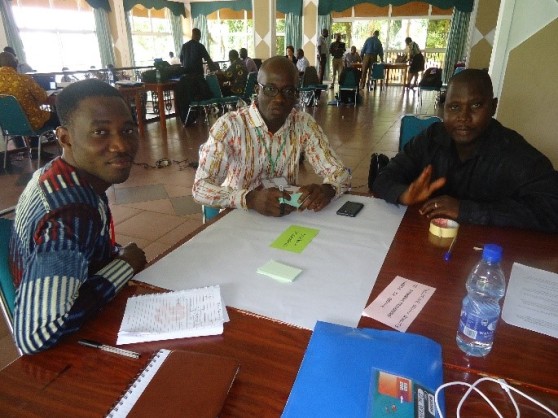 |
Part of the project Team from Benin at
Write-shop in Entebbe, Uganda
|
As part of this effort, a write-shop was help in Entebbe, Uganda in November 2014. The ARF Call was particularly of interest because it provides for multi-stakeholder consortia engagements in integrated agricultural research for development and is an opportunity to promote linkages in research for development between knowledge centres (universities), public and private practitioners as well as research organisations to address aspects of applied research for innovation.
The Benin Consortia has won two projects in which the Dean of Faculty of Agronomic Sciences at the University of Abomey-Calavi (Prof Joseph Hounhouigan) will engage faculty members to work closely with stakeholders in the multi-stakeholder platform, particularly (SOJAGNON-NGO, led by Mr. Patrice Sewade) to implement two projects, described below:
- Matching grain quality attributes to the requirements of soybean processors in Benin (ProSeSS): In Benin, soy farmers hardly have access to quality seeds. Harvest shares are used as sowing seeds. Moreover, it is difficult to differentiate soy varieties, due to sale of mixtures. This project aims at improving the quality of soy seeds and soybeans. SOJAGNON-NGO, UAC/FSA, IITA. WU/MCB and REDAD will collaborate in this interdisciplinary and participatory project, and expect to deliver: a strategic plan for certified soy seed production; nine viable soy seed production enterprises; two master students; four scientific publications; a selection of end-product oriented and adapted soybean varieties; and guidelines for soybean varieties identification at farm and market level.The project activities and results will be disseminated through workshops, publications, technical manuals, and leaflets. The total Project budget is Euros 321.983 and it will last 36 months.
- Designing appropriate agronomic and processing practices for pineapple supply chains in Benin: Pineapple producers, fresh pineapple exporters, traders and processors face challenges in sale and export of fresh pineapple or derived products. The current project aims at improving the quality of fresh pineapple and pasteurised pineapple juice for local, regional and international markets. The project will combine crop sciences and food sciences to (i) determine appropriate agronomic practices to meet market requirements and (ii) determine appropriate processing technologies delivering stable pasteurised pineapple juice for local and regional markets. The Project Consortium include 2 research institutes, 1 private organisation and 1 public organisation. Budget is Euros 299,950 for 36 months.
The ARF is a subsidy scheme of the Dutch Ministry of Foreign Affairs created to improve the use of knowledge and encouraging innovation for development impact in the 15 partner countries of Dutch development cooperation. RUFORUM leads Work Package Capacities under the EU supported Project ‘Platform for African European Partnerships in Agricultural Research for Development’ (PAEPARD).
RUFORUM has under the auspices of PAEPARD also in addition to the Benin Consortia engaged and support other consortia in the ARF Call Round 1 to successfully win ARF projects. These include:
- More potatoes – Secure food in Burundi: Potato in sub-Saharan countries is rapidly becoming a crop that substantially contributes to food security and well balanced diets. As ‘seed’, potato tubers are planted that need special care to make sure they are well sprouted and avoid diseases. Research, development and knowledge transfer involving growers are aimed at this and is being implemented by a consortium of partners including the National University of Burundi. Budget is Euros 295,886 for 36 months.
- Indigenous African Vegetable systems for better livelihoods: Indigenous vegetables have unique production and nutritional characteristics that can solve a myriad of problems in sub-Saharan Africa. This project seeks to establish a robust Indigenous Vegetables value chain and incentive system that responds to the smallholder farmer conditions to increase production and access to the local, national and international markets. The University of Eldoret is actively engaged in implementation of this project.The total project budget is Euro 348,856 and it will last for 36 months.



















